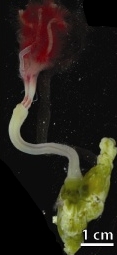Marine microbial symbiosis
Marine microbial symbiosis refers to the close and often long-term interactions between microorganisms and marine organisms. This symbiotic relationship can be mutualistic, where both partners benefit, commensalistic, where one benefits without affecting the other, or parasitic, where one benefits at the expense of the other. Marine microbial symbiosis plays a crucial role in the ocean's ecosystems, contributing to nutrient cycling, disease prevention, and the health and survival of marine species.
Types of Marine Microbial Symbiosis[edit | edit source]
Marine microbial symbiosis can be categorized into several types based on the nature of the relationship:
Mutualism[edit | edit source]
In mutualistic symbiosis, both the host and the microbe benefit from the relationship. A well-known example is the symbiosis between corals and zooxanthellae, a type of photosynthetic algae. The algae provide the coral with organic carbon and energy through photosynthesis, while the coral provides the algae with nutrients and a protected environment.
Commensalism[edit | edit source]
Commensalism occurs when one organism benefits from the relationship without harming or benefiting the other significantly. An example is certain bacteria that inhabit the surface of marine animals, such as sharks, where they can derive nutrition from the host's body without affecting the host.
Parasitism[edit | edit source]
Parasitic relationships are characterized by one organism, the parasite, benefiting at the expense of the host. An example in the marine environment includes certain types of bacteria and viruses that infect marine species, causing diseases that can lead to the decline of affected populations.
Importance of Marine Microbial Symbiosis[edit | edit source]
Marine microbial symbiosis is vital for the health and stability of marine ecosystems. It plays a key role in:
- Biogeochemical Cycling: Microbial symbionts are essential for the cycling of nutrients, such as nitrogen and sulfur, in the ocean. This cycling is crucial for the productivity and functioning of marine ecosystems.
- Coral Reef Health: The symbiotic relationship between corals and algae is fundamental to the health and growth of coral reefs, which are some of the most biodiverse ecosystems on the planet.
- Disease Prevention: Some symbiotic microbes provide their hosts with protection against pathogens, enhancing the survival and fitness of their marine hosts.
Challenges and Threats[edit | edit source]
Marine microbial symbiosis faces several threats, including climate change, pollution, and overfishing. These threats can disrupt symbiotic relationships, leading to the decline of marine species and ecosystems. For example, rising ocean temperatures can cause coral bleaching, where corals expel their algal symbionts, leading to a decrease in coral health and mortality.
Research and Conservation[edit | edit source]
Research on marine microbial symbiosis is crucial for understanding the complexities of marine ecosystems and the impacts of environmental changes. Conservation efforts aimed at protecting marine environments can help preserve these vital symbiotic relationships. Efforts include establishing marine protected areas, reducing pollution, and mitigating climate change impacts.
Search WikiMD
Ad.Tired of being Overweight? Try W8MD's physician weight loss program.
Semaglutide (Ozempic / Wegovy and Tirzepatide (Mounjaro / Zepbound) available.
Advertise on WikiMD
|
WikiMD's Wellness Encyclopedia |
| Let Food Be Thy Medicine Medicine Thy Food - Hippocrates |
Translate this page: - East Asian
中文,
日本,
한국어,
South Asian
हिन्दी,
தமிழ்,
తెలుగు,
Urdu,
ಕನ್ನಡ,
Southeast Asian
Indonesian,
Vietnamese,
Thai,
မြန်မာဘာသာ,
বাংলা
European
español,
Deutsch,
français,
Greek,
português do Brasil,
polski,
română,
русский,
Nederlands,
norsk,
svenska,
suomi,
Italian
Middle Eastern & African
عربى,
Turkish,
Persian,
Hebrew,
Afrikaans,
isiZulu,
Kiswahili,
Other
Bulgarian,
Hungarian,
Czech,
Swedish,
മലയാളം,
मराठी,
ਪੰਜਾਬੀ,
ગુજરાતી,
Portuguese,
Ukrainian
Medical Disclaimer: WikiMD is not a substitute for professional medical advice. The information on WikiMD is provided as an information resource only, may be incorrect, outdated or misleading, and is not to be used or relied on for any diagnostic or treatment purposes. Please consult your health care provider before making any healthcare decisions or for guidance about a specific medical condition. WikiMD expressly disclaims responsibility, and shall have no liability, for any damages, loss, injury, or liability whatsoever suffered as a result of your reliance on the information contained in this site. By visiting this site you agree to the foregoing terms and conditions, which may from time to time be changed or supplemented by WikiMD. If you do not agree to the foregoing terms and conditions, you should not enter or use this site. See full disclaimer.
Credits:Most images are courtesy of Wikimedia commons, and templates, categories Wikipedia, licensed under CC BY SA or similar.
Contributors: Prab R. Tumpati, MD



